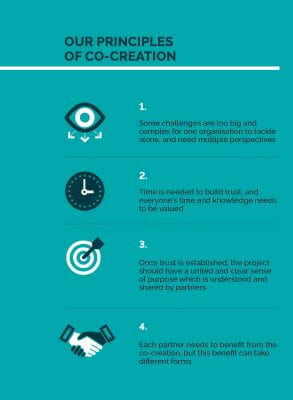Co-creation, or ‘Helping Each Other Out’?
By Rory, on 15 April 2020
Pippa Coutts from Carnegie UK Trust has written this great blog for us about a recent piece of co-creation work that they have been involved in, thanks Pippa!
Carnegie UK Trust works to improve well-being across the UK and Ireland. Evidence and policy learning is vital to setting our priorities and determining how we work. We are passionate about making academic research more useful, focusing on the needs of a range of research users in policy and practice.
As a part of this, we are continuously exploring the possibilities for research to be co-produced between researchers and individuals or organisations. In the latter case, we have worked with the University of Newcastle to produce tools that support the co-creation of research between sectors.
The co-creation tools have been created through a collaboration of – what is sometimes referred to as ‘the quadruple helix’ – the third, public, private and university sectors. A key message from this project is that people consume information in different ways, and like different types of tools. So we have produced a booklet , an infographic, a set of case studies, and a short film that features successful examples of co-creative working.
We define co-creation as working together for mutually beneficial outcomes – a win win situation. But we know from experience that co-creation is hard work, not least because it takes time, and requires skills and patience to build lasting relationships.

Graphic showing the Carnegie Principles of Co-creation (these are also outlined in detail in the blog as it continues)
The partners in the co-creation project came up with a set of key principles (as also outlined in the image above), which are threaded throughout the tools, to facilitate co-creation. They are:
- Some problems are too big and complex to face alone. One of these is the problem that Newcastle City Council faced with responding to the bedroom tax, and why they joined with the University to develop a clearer understanding of the impact of the tax and how to mitigate it.
- Time is needed to build trust. There are several examples of this in the video resource, such as the partnership between Cognicare and the University of the Highlands and Islands in the development of the App for people looking after someone with dementia.
- The project needs a goal(s) that is/are shared by all partners. This is goals that are shared by disparate groups of people who may not have worked together before, such as the older people, care providers and engineers in the Future Homes project in Newcastle.
- Each partner needs to benefit from the co-creation. This was the case in the collaboration between the private sector Nexus and OpenLab in Newcastle University that fed into the design of the new Newcastle Metro train.
Do these principles resonate with your experience? We are aware that the evidence around the impact of good quality co-produced research is limited, although there is a growing body of positive narratives. If you have a story to tell about co-creation, please get in touch with me (Pippa) at pippa@carnegieuk.org
Get involved in the UCL Centre for Co-production in Health Research
Email Rory coproduction@ucl.ac.uk if you’re curious about the Centre. Or:
- Let us know if you’d like to join in collaborating on our blog! You could tell us a bit about yourself, share learnings from co-production projects, or let us know if you have any other ideas.
- Send us resources to feature here next month, or tag us on Twitter @UCLCoPro
If you’d like to keep hearing about what we’re up to and what we’re learning at the Centre, feel free to sign up for our newsletter.
Feel free to email Rory at coproduction@ucl.ac.uk if you’d like a PDF or Word copy of this blog.
(Cover image. Description: cartoon of lit up light bulbs in green, yellow and purple. Image credit: www.meltwater.com)
 Close
Close


